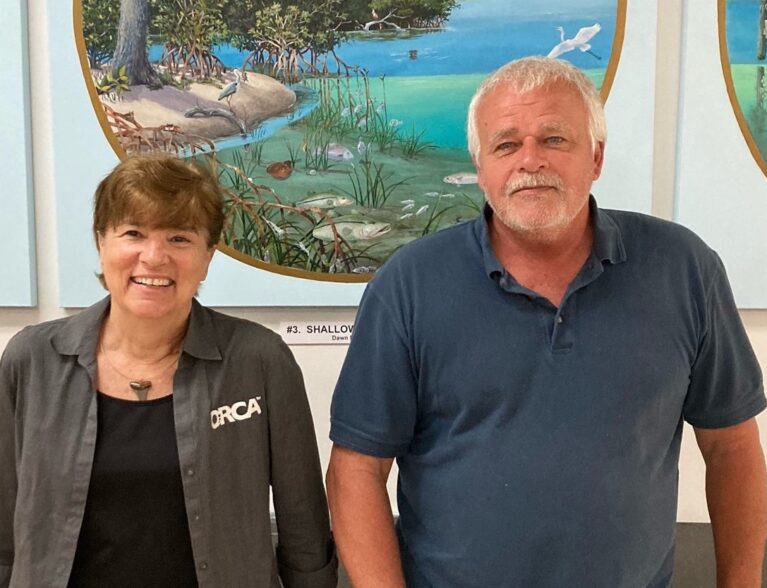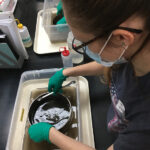
The Ocean Research and Conservation Association, which was first to sound the alarm about problems in the Indian River Lagoon back in 2012, hopes to be operating soon out of the former Waddell Insurance building at the Vero Beach Municipal Marina.
The deal isn’t final yet, but ORCA very much wants to move in, and the city supports the idea.
Founded by world-renowned marine research scientist Edie Widder – a MacArthur Genius award-winner who has made important discoveries about the functions of bioluminescence in the oceans and was first to film a giant squid in its deep-water habitat – ORCA was forced to vacate its longtime headquarters and lab space on the Fort Pierce Inlet earlier this month.
That space was in a former Coast Guard station – an exceptionally picturesque but cramped facility with docks out back where ORCA had operated for more than 10 years.
Earlier this summer, Indian River State College, which owns the former Coast Guard property, declined to renew ORCA’s lease, citing the age and condition of the building, which was built in 1937, saying it was no longer habitable.
Caught off guard with only 60 days to relocate, Widder and her managing director Warren Falls put some stuff in storage and shifted most operations and research to the organization’s small Citizen Science Lab near the Vero Beach Airport. There, scientists and other staff members and students working shoulder-to-shoulder are keeping ORCA’s wide array of education and research programs running in the interim.
But they need more space, and they need it quickly.
Widder told Vero Beach 32963 several weeks ago the organization is looking for a building with about 5,000 square feet of space that is on, or very close to the lagoon, somewhere between Jensen Beach and Vero.
The city-owned building at 3599 Indian River Drive, next to the city dog park and in front of the marina’s boat storage shed, perfectly meets those requirements.
Built as a boat dealership in 1977, the sleek, modernist building with a glass front is a bit shabby and overgrown at the moment, but it has 3,321 square feet of air-conditioned interior space, along with a 1,620-square-foot covered veranda in front where boats used to be displayed, which adds up to a total of 4,941 square feet.
Add in the fact that the building is 200 feet from the shore of the Indian River Lagoon, near docks where ORCA could moor its boats, and it seems ideal.
“They contacted us about moving in there on an interim basis, and we are trying to figure out if we can accommodate them,” says Vero Beach City Manager Monte Falls.
“ORCA is a great organization with a great mission to save the lagoon – which is a mission we all share, and we would be happy to have them there.
“I’ve checked with the council members, and they support the idea, but we are going to be building a larger boat storage building and we have to make sure we can meet open space and stormwater requirements on the property. We should know where we are at with that in the next week or so.”
Long-term, Widder and Falls hope to establish a permanent headquarters and research lab within the city’s riverfront redevelopment project at 17th Street and Indian River Boulevard, where the old “Big Blue” power plant and the city sewage treatment facility are located.
The latest version of the mixed-use plan, the May 2021 “Three Corners Community Plan,” shows a marine research facility on the south side of the development.
“A research facility is part of the plan, and ORCA would be a good candidate for that spot,” says Falls. “But the sewer plant will be operating for at least the next five years, so they need someplace in the interim.”
Widder, a marine biologist, oceanographer and inventor, sank her $500,000 MacArthur award into founding the Ocean Research and Conservation Association to help protect and restore the Indian River Lagoon and the oceans.
After her widely acclaimed encounter with the giant squid, which had never been seen alive in the ocean before, Widder was courted by a persistent New York literary agent who talked her into writing a memoir about her scientific exploits.
Two years in the making, the book when complete was accepted by six publishers and sold to Random House, which published it this month with the title: “Below the Edge of Darkness.”
A cover blurb written by filmmaker and ocean explorer James Cameron gives a sense of Widder’s extraordinary career:
“Edith Widder’s story is one of hardscrabble optimism, two-fisted exploration and ground-breaking research. She’s done things I dream of doing.”





